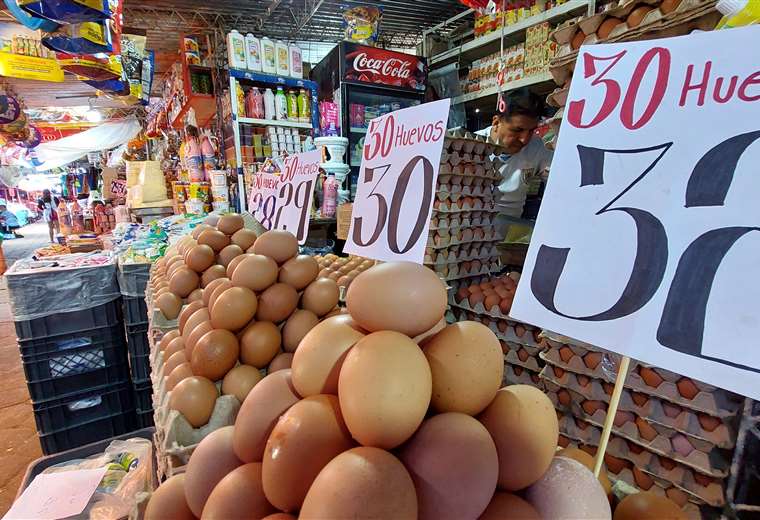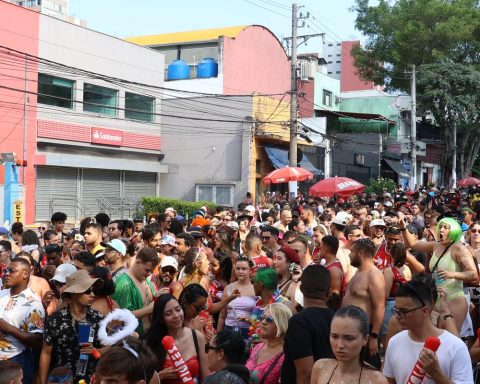May 21, 2023, 4:06 AM
May 21, 2023, 4:06 AM
The prices of eight foods in the basic food basket (chicken and beef, eggs, cheese, flour, sugar, noodles, and edible oil) erode purchasing power and leave ‘scars’ on the economy of the most vulnerable families. In the markets, traders say that price fluctuations are periodic, hinting that the clandestine entry of illegal merchandise from neighboring countries slows down a further expansion of costs.
The rise in prices contrasts with the official figures, because In the first quarter of this year, inflation reached -019%.
In a tour carried out by EL DEBER, the readjustment of food prices is evident. Thus, Josefina Guzmán, who sells products from dairies and poultry farms in her store in the old Abasto market, said that cheese and eggs increased in value rapidly in the last two weeks. She indicated that the price of the price of first and large egg maple went from Bs 20 and 21 to Bs 32; second, from Bs 20 to 30; third, from Bs 18 to 28; and for children, from Bs 15 and 18 to 28. “Imagine that an egg unit came to cost Bs 1.50. That is historic,” she exclaimed.
In the case of cheese, he explained that in the same period the value rose from Bs 24 to 30 per kilogram. He noted that the maximum peak of Bs 32 was registered a week ago. In his offer, he said that the price of Gordito butter also increased from Bs 16 to 20 per kilo; and butter, from Bs 12 to 18 per kilo. “The real thing, from my modest appreciation, is that the economy is not good and the lack of working capital is reflected in the drop in sales ”, Guzmán noted, when questioning the official figures regarding the inflation rate, whose figures according to her, are “made up” and not credible.
This month, the Food and Agriculture Organization of the United Nations (FAO) reported that Bolivia, with a rate of 2.2% as of September last year, has the lowest food inflation in Latin America.
Norma Araníbar, owner of a grocery store, like Guzmán, believes that the FAO estimate and figures from the national government do not match the reality of prices in the markets. “They do not market. People buy less because they don’t have enough, on top of that prices, in the case of sugar, noodles, oil and cereals, have skyrocketed in the last four weeks”, he pointed out.
He realized that, for example, a one-kilo bag of sugar went from Bs 5.50 to 6, and for five kilos, from Bs 25 to 30. The kilo of national brand flour rose from Bs 5 to 7; while the package that contains 10 kilos, from Bs 48 and 53 to 62 and 63. From Argentine brands, those that are offered come from contraband, the one kilo package costs Bs 5 per kilo, and the package Bs 50.
In the case of sugar, Araníbar expressed that three months ago it adjusted its value. The one kilo bag went from Bs 5 to 6, while from five kilos from Bs 24 and 25 to 26 and 28. Edible soybean and sunflower oil from the national industry, according to her, rose on average Bs 1. He cited that the oils that come from neighboring countries, mainly Argentina, enjoy a high preference due to the price difference.
Offer of livestock origin
The price of chicken and cattle meat, according to traders, also rose. Thus, at her chicken stall, Sulema Cabrera, stated that for the past two weeks the value of this basic product on the tables of Santa Cruz has become significantly more expensive, reaching a price of Bs 16 (mairañeno) and Bs 16, 50 (processing in poultry industries).
The setting of the value also touches the dams. The kilo of leg climbed from Bs 14 to 18; wings, from Bs 18 to 21, while the breast, from Bs 18 to 22. “The price affects the drop in sales that, in my case, the average is 40%”, noted Cabrera.
Of the causes of the increase in the cost of the product, she explained that the Suppliers limited themselves to pointing out that it is due to the aftermath of the bird flu outbreak in Cochabamba and the high price of imported poultry supplies.
Regarding the price of bovine meat, merchants They mentioned that the adjustment implies Bs 2, depending on the cut and quality of the meat offered. They argue that ranchers raised the kilo hook.
A supplier of this product refuted what was said by the marketers, realizing that the supply of cattle in the auction and slaughter centers is regular and that the livestock sector does not set or intervene in the definition of the final price of meat in the markets.
In the case of the price of the egg, from the Association of Poultry Farmers of Santa Cruz (ADA), President Omar Castro, attributed the consequences to the avian flu, toclarifying that after the Cochabamba outbreak, more than 600,000 laying birds were slaughtered and died, which had an impact on a 15% decrease in egg supply in the country.
Likewise, he explained that the quarantine of poultry farms imposed by the official animal health service (Senasag) limited the accommodation and animal load, which generated a gap in the production of chicken meat. “Santa Cruz filled that gap and that reduced the offer, that explains the rise in the price of chicken and eggs,” said Castro.
The poultry leader noted that the recovery of production will be gradual, expecting a greater supply of chicken in the next five weeks and, in the case of eggs, a partial recovery in three and months and full until the end of the year, considering the production cycle and the replacement of laying birds eliminated and killed as a result of bird flu.
This month, President Luis Arce admitted that there is an increase in the prices of chicken meat and eggs,contributing the effect to the avian flu that the country faced at the end of January and that led to the culling of several birds.
According to the National Institute of Statistics (INE), the Wholesale Price Index (IPM) registered in March a decrease of -0.72% compared to February, while the accumulated variation to the third month was positive of 0.74% and to 12 months of 10.11%. Among the products with the highest inflationary incidence, the chicken egg, fresh chicken meat, coca leaf, peach, soybean cake and barley appear.
In this regard, from the National Chamber of Oilseed Industries of Bolivia (Caniob), President Jorge Amantegui, clarified that theThe industries sell the flour and oil to the internal market with a price established by the Government, through a bi-ministerial resolution; therefore, “If there are prices above those established by the norm, for any of these products, it must be the result of intermediaries”, exhe pleaded, mentioning that prices should not increase, in the short or long term.
While sources from the sugar sector affirmed that since 2016 the prices of this product were ‘depressed’ due to a special situation in the external and internal market. “Indeed, the price of sugar has been at Bs 5.50 per kilo for more than 6 months, This value recovery will inject the sector with encouragement to recover production levels to satisfy domestic market consumption and generate foreign currency for the State”, expressed leaders consulted.
In the case of flour, industry sources, at a national level, affirmed that the increase in the price of raw material (wheat), the transference of transfer costs in the financial system from the suppliers of imported inputs to the milling industries and the shortage of US foreign currency in the national market they impact the structure of production costs and affect the price to the final consumer.
They note that 100% of the flour available in the markets, especially Santa Cruz, comes from contraband and that, due to the exchange difference in Argentina, it is impossible to compete. “There is unfair price competition,” the sources said.

















